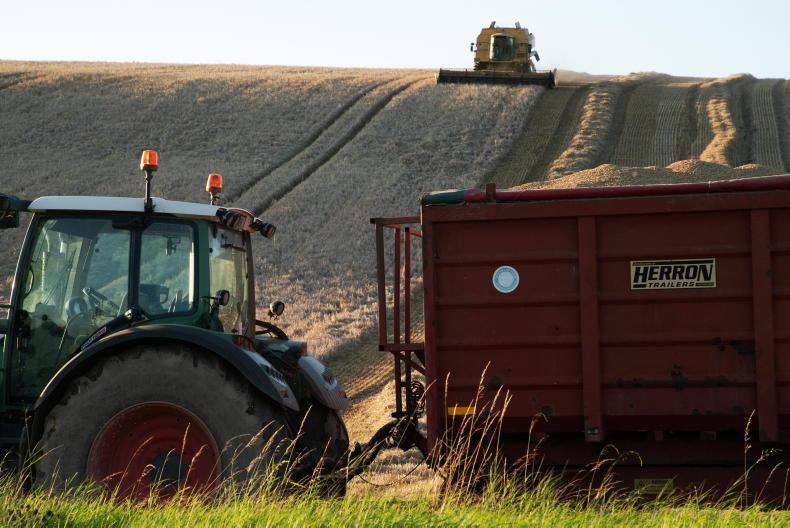A flat-rate payment to support tillage farmers is among suggestions made by stakeholders to support the tillage sector and, in turn, maintain or increase the sector’s area.
The suggestion is among a set of seven proposals to increase the tillage area in this country, which were sent to Minister for Agriculture, Food and the Marine Charlie McConalogue on Friday from a sub-group of the National Fodder and Food Security Committee.
Minister McConalogue requested the proposals from the committee in early July. The group met on Thursday 28 July and the proposal was turned around quickly.
Low confidence
The group was clear that confidence in the sector is low and, as a result, maintaining area will be difficult.
Teagasc estimates that production costs for cereals in 2023 will be 60% higher than they were in 2021, resulting in break-even costs of production of €202/t for winter wheat (4t/ac) and €200/t for spring barley (3t/ac).
Confidence also needs to be increased in the industry supply chain to ensure commitments are made to securing supplies, such as fertiliser, and the flat-rate payment could help with this task.
The set of proposals put forward aim to support the sector in the short and long term and there is a clear message that any Tillage Incentive Scheme should aim to keep that land in tillage for a number of years, as many crops planted this year were under sown with grass.
Nitrates and CAP
The document sent to the Minister also outlined the need for clarifications on nitrates rules and CAP requirements as soon as possible, as tillage farmers and those planning on increasing tillage area are now planning for 2023.
TAMS
There were calls from the group to include more basic items in the TAMS for tillage, including grain trailers and temporary grain storage facilities.
Carbon footprint
A hugely positive suggestion from the Irish Grain and Feed Association called for carbon footprint calculations specific to Irish animal feed to be calculated and accredited by the Global Feed Life Cycle Assessment Institute (GFLI).
This provides an opportunity to promote native grain and add value to the food chain.
Straw Incorporation Measure
The Straw Incorporation Measure (SIM) received praise from the group and it was pointed out that expanding the scheme was unlikely to impact negatively on the straw market and was also a positive step in offsetting carbon emissions.
1. Support to all tillage farmers to retain the existing tillage area and help to mitigate the high level of risks in production that are forecast for 2023. Options here could include a flat-rate support payment and/or risk management measures based on grain/fertiliser price ratios or similar. The role for price insurance mechanisms, as currently operated in other countries such as the USA, merit further consideration as a mechanism to de-risk the growing of tillage crops.
2. Continue with a Tillage Incentive Scheme (TIS) to support farmers to produce more tillage crops for 2023. This should be targeted to ensure production is maximised and that grain crops that substitute for dry feed imports should be promoted and that tillage area supported by the scheme can be sustained in medium- to long-term crop production.
3. Continue supports for protein crops to ensure an increasing supply of native proteins for the food and feed industries (it is proposed that this support will increase to €350/ha under the new CAP).
4. Continue supports through the SIM, with opportunities to increase eligible area per farm and/or payment rate per hectare.
5. Create more opportunities for growers and contractors to avail of investment support mechanisms under TAMS and future similar schemes. Wider eligibility and increased investment ceilings for tillage machinery, equipment and facilities would support the cost-base and infrastructure across the sector.
6. Develop the processing sector to take advantage of value-added opportunities for Irish crops. This would create greater opportunities for Irish-grown crops within higher-value food chain streams, including increased opportunities for exports and leveraging on Ireland’s quality assurance and Origin Green credentials and standards. This should build on current positive added-value developments in the drinks and cereals (eg oats) sectors.
7. Develop opportunities to leverage the benefits of homegrown grains over imported alternatives in terms of carbon footprint and food miles for both food products and animal feeds.
The proposals were sent to the Minister along with submissions from the represented organisations in the group, among them the Irish Farmers’ Association, the Irish Grain Growers Group, the Irish Cattle and Sheep Farmers Association and the Farm and Forestry Contractors of Ireland.






 This is a subscriber-only article
This is a subscriber-only article










SHARING OPTIONS: